Before Google Fiber, before broadband, before you got bombarded with enough AOL free trial CDs to build your family a (very pointy and ineffective) home, the internet was a vastly simpler thing. Here are two first-hand accounts of internet life in the ’80s, when porn was restricted to asterisks and dashes and the screeching sound of dial-up was music to young computer geeks’ ears.
Have any fun early internet memories of your own? Share ’em with us down below.
David S. Rose, Quora: I’ve been online personally since 1979 and through school terminals since about 1973. Anyone out there remember playing lunar landing games on the university timesharing systems?
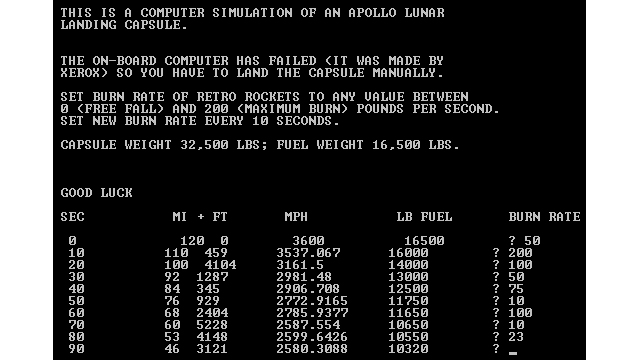
My first Apple computer used a cassette tape recorder to store data, because Steve Wozniak hadn’t yet designed the controller software for Apple’s first floppy disk drive.
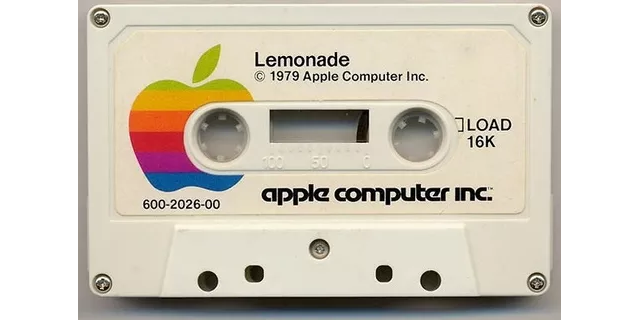
My first external connections were through a Hayes Micromodem, which ran at the blistering speed of up to 300 bits per second (way faster than the previous standard of 110 bps).
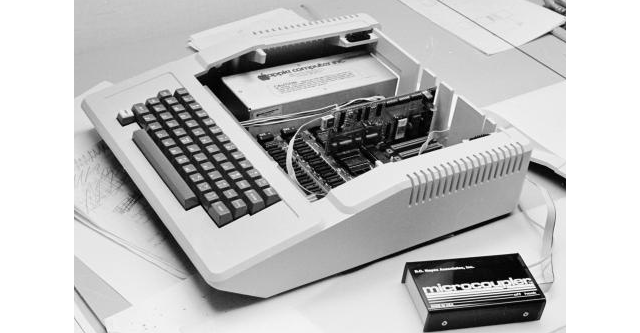
While few of you young ‘uns will remember the name Hayes, for us old timers it (and the iconic casing for its product which remained the same during three orders of magnitude of exponential technological development) was almost as ubiquitous as Apple is today — although Apple itself was just one of many competitors back then.
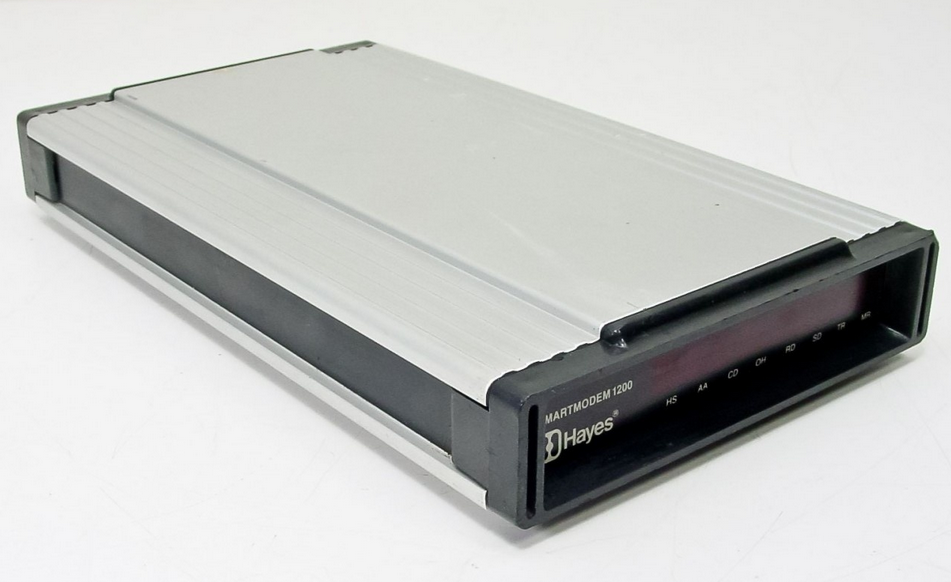
The following clip is what we used to hear when our Hayes modem would pick up the telephone and dial into our Internet Service Provider. The 28 seconds (which happened every time, my young grasshopper) were the sounds of the modem negotiating the speed of the connection with the other end. This sound eventually got to be so familiar, that anyone
alive during that period can probably hum or whistle this from memory:
The reason for this trip down memory lane is to point out that in my particular case this exponential development of technology has been somewhat like taking a bath that starts out at exactly room temperature and slowly is brought to a boil.
I’ve always been pretty close to the “forefront” of technology, so for me the past 35 years have felt like a seamless continuum…whereas for those being freshly exposed to new technology it comes across as a step function.
Back in the mid 90s I was negotiating a deal with Lycos (one of the original big search engine portals, probably equivalent then to what Yahoo is today). I can remember with perfect clarity the rather pompous BusDev executive haughtily informing me that they had one of the world’s largest data centres (think ‘Apple’s cloud data center in North Carolina’) that stored almost eight terabytes of data!
Today you can get an 8TB drive for $US600 and carry it in your laptop bag.
The bottom line is that for me, the differences between then and now have had, perhaps counterintuitively, much less impact than they have had for an outsider… just as I suppose the 8 terabit per second Internet2 connection that I’ll have on my iPhone in a few years will seem simply a logical extension of the 100mbs broadband service I have today in my apartment.
Makikio Itoh, Quora: My online home of choice in the late ’80s to the early ’90s was CompuServe, or CIS (the acronym for CompuServe Information Service). It was purely a coincidence that I chose CompuServe; I got a Radio Shack Tandy T2000 computer in 1987, which came bundled with various bits of software on floppy disks including a signup package for CompuServe. The computer also had a built-in 300 baud modem. If I’d gotten a PC just a bit later, chances are my first online experience would have been on AOL instead.
CompuServe was initially rather intimidating. Once you logged on, you were greeted with a screen like this — but even more basic (since the screenshot shows a later development, a CIS-access software called Procomm Plus):
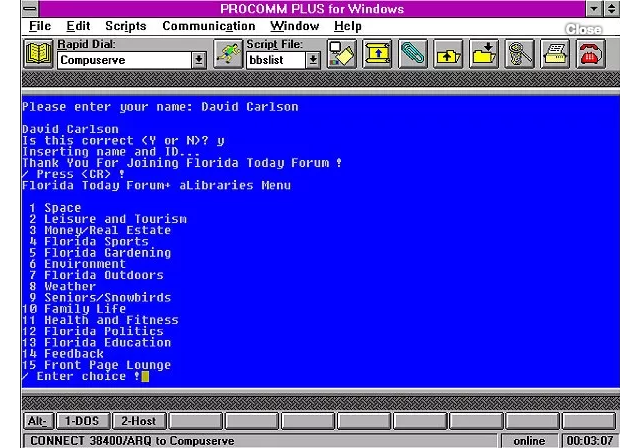
Everything was text based, of course. Most of the action went on around forums, the CIS name for interest groups. (The alternate name for forum was SIGs – Special Interest Groups.) Forums revolved mainly around discussion boards, and most forums had a wildly useful repository of files for various sorts from programs (‘apps’ to you kids), as well as text files and images; crude, real time chat and instant messaging was also possible.
To find the forums that met your interests you could spend hours pecking around, and in those days you were charged by the minute for your online time — plus phone charges in some cases. Or, you’d have to look through actual paper books that had titles like “The CompuServe Directory” or “CompuServe White Pages.”
Over the next five to six years or so, I lived on CompuServe for hours every day. In those days, they charged by the minute for your online time. In my worst month my bill was $US800, and this was at a time when I was earning about $US220 take-home pay a week. Things got dicey. I eventually found out a way to get a free account, though; one of the coveted SysOp (or forum administrator) accounts. The advent of software like TapCIS and OzCIS that automated your CompuServe sessions so you could log off and on fast helped a lot, too.
One of the things about CompuServe that reminds me of Quora is that they required the use of real names. As you all know, the use of real names faded over the years since the early days to the extent that, in many corners of the internet, anonymity and pseudonyms became the norm. But sites like Quora, LinkedIn, and (to a much lesser extent) Facebook requiring or encouraging the use of real names is kind of going back to the way things were in those bygone days.
When it came down to it, the online world was, as it is now, just as much about connecting with other people as it was about gaining information or whatnot. At least for me.
Among the things I did on CIS during those years:
- Exchanged messages directly with people like Michael Dell, who used to personally answer questions about his company’s computers to individual users on the IBM Hardware forum and such, just to give one example. There were others like that, too, but mostly from PC makers that are long gone now. (Anyone remember Northgate for example?) I guess the closest experience to that you have now is people like Jimmy Wales or Stephen Fry answering the occasional question on Quora, except that it was a lot more direct and not that many people at the time were impressed.
- Played fantasy baseball for several years.
- Ran a fantasy ice hockey league with 9 other people, and learned a lot of Quebecois slang along the way. I remember entering the entire NHL roster with all the stats into a spreadsheet, by hand.
- Made a lot of friends from all over the world.
- Lost a lot of friends, too.
- Went to many real-life meetups (we called them ‘bashes’). Stayed at the homes of several people that I had only known prior to that online. We may have been a lot more trusting then, although when I see sites like Couchsurfing, maybe not!
- Witnessed many hookups resulting from those IRL meetings, some of them extra-marital (not by me though — I was way too shy).
- Fell in love, passionately, more than once, but most of those people didn’t know about it. Again, the shyness.
- Acquired a pesky online stalker.
- Met my future husband.
Everything anyone’s been doing online in recent years was done back then too, so I chuckle when people still marvel about the ‘new’ phenomenon of people meeting people online. Been there, done that, have the (mental) scars to prove it.
What was it like to be on the Internet during the 1980s? originally appeared on Quora. You can follow Quora on Twitter,Facebook, and Google+.
This answer has been lightly edited for grammar and clarity.
